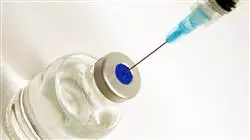University certificate
The world's largest faculty of pharmacy”
Introduction to the Program
Learn everything you need to know about Zoonosis and Parasitosis through this Postgraduate diploma, and become an excellent professional in the pharmaceutical field"

Immerse yourself in the knowledge of infectious diseases, which are one of the main problems of today's healthcare”
This Postgraduate diploma in Zoonosis and Parasitosis for Pharmacists contains the most complete and up-to-date educational program on the market. The most important features of the program include:
- Practical cases presented by experts in infectious diseases
- The graphic, schematic, and practical contents with which they are created, provide scientific and practical information on the disciplines that are essential for professional development
- Practical exercises where the self-assessment process can be carried out to improve learning
- Special emphasis on innovative methodologies
- Theoretical lessons, questions to the expert, debate forums on controversial topics, and individual reflection assignments
- Access to content from any fixed or portable device with an Internet connection
If you want to grow and position yourself within a sector that increasingly demands expert pharmacists in the field, this program is for you”
The program’s teaching staff includes professionals from the sector who contribute their work experience to this training program, as well as renowned specialists from leading societies and prestigious universities.
The multimedia content, developed with the latest educational technology, will provide the professional with situated and contextual learning, i.e., a simulated environment that will provide immersive training programmed to train in real situations.
This program is designed around Problem-Based Learning, whereby the professional must try to solve the different professional practice situations that arise during the academic year. For this purpose, the student will be assisted by an innovative interactive video system created by renowned and experienced experts.
Study with us and you will be able to accurately diagnose cases of animal or parasite infections"

In addition to having the best course on the market at your fingertips, you will obtain a qualification from a prestigious university: TECH"
Why study at TECH?
TECH is the world’s largest online university. With an impressive catalog of more than 14,000 university programs available in 11 languages, it is positioned as a leader in employability, with a 99% job placement rate. In addition, it relies on an enormous faculty of more than 6,000 professors of the highest international renown.

Study at the world's largest online university and guarantee your professional success. The future starts at TECH”
The world’s best online university according to FORBES
The prestigious Forbes magazine, specialized in business and finance, has highlighted TECH as “the world's best online university” This is what they have recently stated in an article in their digital edition in which they echo the success story of this institution, “thanks to the academic offer it provides, the selection of its teaching staff, and an innovative learning method aimed at educating the professionals of the future”
A revolutionary study method, a cutting-edge faculty and a practical focus: the key to TECH's success.
The most complete study plans on the university scene
TECH offers the most complete study plans on the university scene, with syllabuses that cover fundamental concepts and, at the same time, the main scientific advances in their specific scientific areas. In addition, these programs are continuously being updated to guarantee students the academic vanguard and the most in-demand professional skills. In this way, the university's qualifications provide its graduates with a significant advantage to propel their careers to success.
TECH offers the most comprehensive and intensive study plans on the current university scene.
A world-class teaching staff
TECH's teaching staff is made up of more than 6,000 professors with the highest international recognition. Professors, researchers and top executives of multinational companies, including Isaiah Covington, performance coach of the Boston Celtics; Magda Romanska, principal investigator at Harvard MetaLAB; Ignacio Wistumba, chairman of the department of translational molecular pathology at MD Anderson Cancer Center; and D.W. Pine, creative director of TIME magazine, among others.
Internationally renowned experts, specialized in different branches of Health, Technology, Communication and Business, form part of the TECH faculty.
A unique learning method
TECH is the first university to use Relearning in all its programs. It is the best online learning methodology, accredited with international teaching quality certifications, provided by prestigious educational agencies. In addition, this disruptive educational model is complemented with the “Case Method”, thereby setting up a unique online teaching strategy. Innovative teaching resources are also implemented, including detailed videos, infographics and interactive summaries.
TECH combines Relearning and the Case Method in all its university programs to guarantee excellent theoretical and practical learning, studying whenever and wherever you want.
The world's largest online university
TECH is the world’s largest online university. We are the largest educational institution, with the best and widest online educational catalog, one hundred percent online and covering the vast majority of areas of knowledge. We offer a large selection of our own degrees and accredited online undergraduate and postgraduate degrees. In total, more than 14,000 university degrees, in eleven different languages, make us the largest educational largest in the world.
TECH has the world's most extensive catalog of academic and official programs, available in more than 11 languages.
Google Premier Partner
The American technology giant has awarded TECH the Google Google Premier Partner badge. This award, which is only available to 3% of the world's companies, highlights the efficient, flexible and tailored experience that this university provides to students. The recognition as a Google Premier Partner not only accredits the maximum rigor, performance and investment in TECH's digital infrastructures, but also places this university as one of the world's leading technology companies.
Google has positioned TECH in the top 3% of the world's most important technology companies by awarding it its Google Premier Partner badge.
The official online university of the NBA
TECH is the official online university of the NBA. Thanks to our agreement with the biggest league in basketball, we offer our students exclusive university programs, as well as a wide variety of educational resources focused on the business of the league and other areas of the sports industry. Each program is made up of a uniquely designed syllabus and features exceptional guest hosts: professionals with a distinguished sports background who will offer their expertise on the most relevant topics.
TECH has been selected by the NBA, the world's top basketball league, as its official online university.
The top-rated university by its students
Students have positioned TECH as the world's top-rated university on the main review websites, with a highest rating of 4.9 out of 5, obtained from more than 1,000 reviews. These results consolidate TECH as the benchmark university institution at an international level, reflecting the excellence and positive impact of its educational model.” reflecting the excellence and positive impact of its educational model.”
TECH is the world’s top-rated university by its students.
Leaders in employability
TECH has managed to become the leading university in employability. 99% of its students obtain jobs in the academic field they have studied, within one year of completing any of the university's programs. A similar number achieve immediate career enhancement. All this thanks to a study methodology that bases its effectiveness on the acquisition of practical skills, which are absolutely necessary for professional development.
99% of TECH graduates find a job within a year of completing their studies.
Postgraduate Diploma in Zoonosis and Parasitosis for Pharmacists
Zoonosis refers to diseases that can be transmitted from animals to humans. Examples of common zoonoses include rabies, salmonellosis and toxoplasmosis. On the other hand, parasitosis refers to diseases caused by parasites, such as intestinal worm infections or malaria.
Pharmacists play a critical role in the prevention and treatment of zoonosis and parasitosis in humans.
Pharmacists can provide patient information on preventive measures to avoid zoonoses and parasitosis. This includes ways to prevent animal bites, quarantines for infected animals, preventive treatments for people traveling to areas where there are known risks of infection, and recommendations for proper food and water handling.
Pharmacists can select and dispense appropriate medications to treat zoonoses and parasitoses. A good understanding of the different parasites and diseases caused by zoonoses will allow selection of the most effective treatments for patients and their pets, which helps reduce the chances of transmission.
Pharmacists can provide guidance to the patient on the side effects of medications and the precautions needed in each particular case. For example, some medications may interact with others, or may be more suitable for certain patient groups, while not working well in others. Patients taking medications to treat zoonoses and parasitosis should be informed and aware of that.
Pharmacists can educate patients about ways to avoid zoonoses and parasitosis. This involves reminding patients to wash their hands after contact with animals, properly handle food and water, and keep pets healthy and parasite-free.
Pharmacists can apply their expertise in the prevention and treatment of zoonoses and parasitosis to educate patients about necessary precautions. Advice on drug selection and dispensing and guidance on the possible occurrence of side effects is essential. In the end, the information provided to patients decreases the risk of disease transmission from animals to humans, resulting in improved public health.







